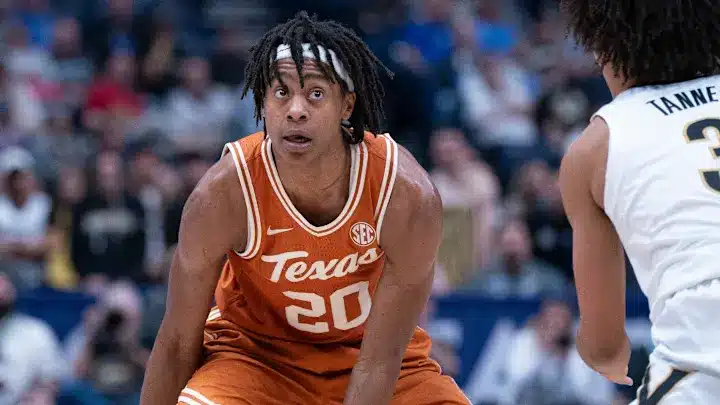If someone had told you that Jayson Tatum would shoot 17.6% from the floor on 3-of-17 shooting in Game 1, your most likely conclusion would be that Ime Udoka’s team lost that battle.
After all, Tatum is the arrowhead of the Celtics‘ offense, the one tasked with punishing a defense, forcing rotations, and providing the space for his teammates to cook. Sure, Boston’s offense might lean into realms of egalitarianism, but Tatum is fast proving himself to be heliocentric to all that Boston does well.
Even on Thursday, where his shot just would not fall, despite some high-quality looks, Tatum found ways to take control of the game.
“We’ve talked about it throughout the year and I’ve talked to him at length about impacting the game when he’s not having his best offensive night. So, he did that tonight. Obviously going 3-for-17, that’s usually not going to happen. What he did well and did early was get others involved.
Seven of nine assists pretty early in the game, finished with 13, and the shots not falling, he still attracts a good amount of attention and made the right plays. I love his growth and progression in those areas, where he’s still guarding on the defensive end, still getting others involved, not pouting about his shots, and trying to play through some mistakes and physicality they were playing with him,” Udoka told reporters following Tatum’s impressive playmaking performance.
I’ve never been a fan of labeling someone’s decision-making as “processing speed” as I believe it’s too robotic, but I’ve come around to the term as it encapsulates multiple skills under one umbrella. With that being said, the above play is indicative of Tatum’s improved processing speed.
Kevon Looney does a great job of defending at the level of the screen, taking away any space for Tatum to get cooking in the lane. However, in the weakside corner, Draymond Green has begun to sag off Marcus Smart, so he’s in position to tag Robert Williams’ inevitable roll to the rim, and/or help if Tatum managed to get Looney onto his hips.
Tatum reads Green sagging off and quickly hits Smart with a skip pass that lands right in his shooting pocket, allowing him to enter his shooting motion immediately, giving the Celtics an easy three points off a tidy dime.
“Just reading the play. They do a great job of helping and things like that. So, you know, obviously, it’s just as simple as if you draw two, find somebody that’s open. That’s what I was just trying to do,” Tatum said after carving open the Warriors’ defense time and time again.
The impressive part about Tatum’s passing on Thursday was that he didn’t try to force it. Most of his assists were to players who were “one pass away” and were the simple option, rather than trying to get fancy with it and consistently hit cross-court passes to the corners. By moving the ball to the nearest teammate, Tatum was able to keep the offense flowing and relocate to ensure the spacing remained at a high level.
Six months ago, Tatum is making the same pass to Pritchard, but he’s doing it before the weakside defender is engaged as a helper. Yet, in the above clip, we can see the St. Louis native’s poise on the ball and understanding of how to control a game on full display. Rather than rushing the pass, Tatum keeps the possession ticking over while pressuring the rim, forcing the defense to react, thus leaving a shooter open in the corner.
Only once the Warriors relinquish their man-to-man coverage does Tatum fire the pass to Pritchard, putting Golden State into scramble mode, and generating a high-quality look for one of Boston’s best perimeter scorers.
Of course, even when Tatum is struggling to score the ball, he still holds incredibly scoring gravity and forces the defense to adjust to his presence. Take the below play for example, and watch how once the Larry Bird Trophy winner hits the paint, Golden State sends all five defenders towards him. That’s the type of fear he instills in teams, regardless of his success or struggles on a night-to-night basis.
Drawing so many defenders towards you on a single play is the definition of gravity, and continues to add to Tatum’s case of heliocentrism. Yet, despite being shown a crowd, Tatum kept a cool head, spotted the weak-side low man rotating over, and hit the corner shooter for the easy bucket.
We saw similar outcomes when Tatum found himself operating from the low post. Defenders were quick to leave their man on the perimeter to pressure the ball and force a pick-up, as they feared the 24-year-old’s post moves and fadeaway, but instead, they should have been worried about his passing skills.
Throughout the contest against the Warriors, it was Tatum’s passing and defense that allowed him to remain impactful in spite of his poor shooting night.
“I had a bad shooting night. I just tried to impact the game in other ways. We’re in the championship. We’re in The Finals. All I was worried about was trying to get a win, and we did. That’s all that matters at this point.”
Yes, the budding superstar isn’t likely to repeat such wild struggles moving forwards, but his playmaking will certainly be required to continue operating at a similar level if he wants to be lifting the Larry O’Brien trophy in a couple of weeks. Lucky for us, Tatum has been exceptional as a playmaker throughout this post-season run, and we’re witnessing his improvements in real-time, let’s just hope that when he rediscovers his scoring touch, he remembers how effective he can be when getting off the ball early.





